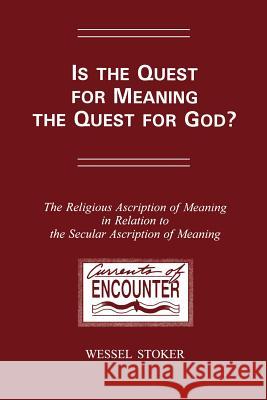Is the Quest for Meaning the Quest for God? : The Religious Ascription of Meaning in Relation to the Secular Ascription of Meaning: A Theological Study » książka
Is the Quest for Meaning the Quest for God? : The Religious Ascription of Meaning in Relation to the Secular Ascription of Meaning: A Theological Study
ISBN-13: 9789042000452 / Angielski / Miękka / 1996 / 256 str.
Is the Quest for Meaning the Quest for God? : The Religious Ascription of Meaning in Relation to the Secular Ascription of Meaning: A Theological Study
ISBN-13: 9789042000452 / Angielski / Miękka / 1996 / 256 str.
(netto: 247,45 VAT: 5%)
Najniższa cena z 30 dni: 258,60
ok. 30 dni roboczych.
Darmowa dostawa!
Traditionally, religion was the supplier of meaning. It is often said that the quest for meaning is at bottom a quest for God, a quest that can only find an adequate answer in religion. But then what is the alternative for those who reject religion? Emptiness and meaninglessness, as Nietzsche succinctly formulated it: We have killed God. Are we not straying as through an infinite nothing? In the meantime, non-believers have found a solution for the crisis in meaning. People are not (usually) nihilists but live their lives and consider them to be meaningful without religion. This study is concerned with determining once again the place of the ascription of meaning from the perspective of the Christian faith in its relation to the non-religious ascription of meaning. For this purpose an analysis is given of contemporary theological and philosophical views of the problem of meaning. The crisis of meaning as it has arisen in Nietzsche and the theatre of the absurd is examined. Stoker also discusses contemporary forms of the ascription of meaning without religion such as self-actualization and functional rationality as sources of meaning. Stoker rejects an 'apologetics of need'. He posits that the Christian faith does not have an exclusive right to the ascription of meaning, but this obtains also for secular forms of the ascription of meaning such as humanism. Is God then the 'ultimate concern' of each person? From the perspective of the Christian faith, yes, but this does not mean that the non-religious ascription of meaning as such must be viewed negatively. Stoker illustrates how the religious and the non-religious ascriptions of meaning are similar and how they differ. Both are intended to be the source of meaning for human questions of life and death. With respect to their differences the author demonstrates that the ascription of meaning from the perspective of the Christian faith does not entail a disqualification of a non-religious worldview but is intended to make people more human.











